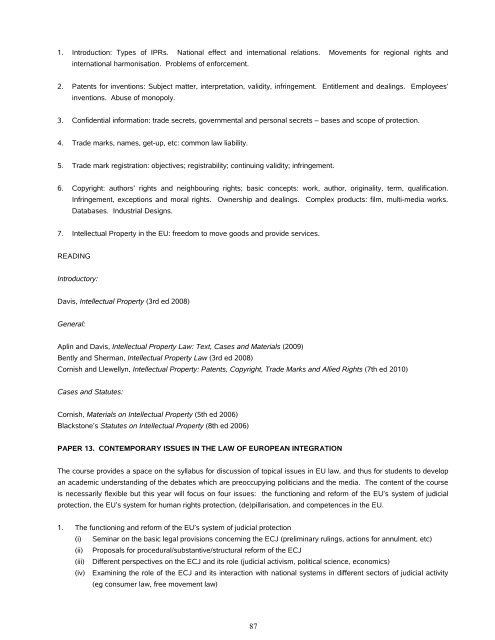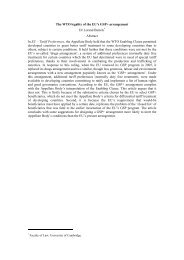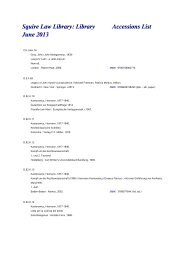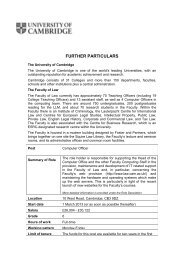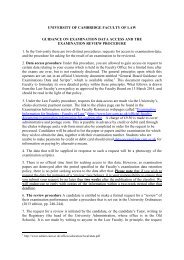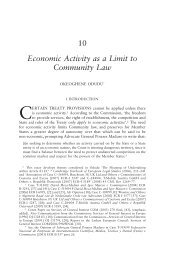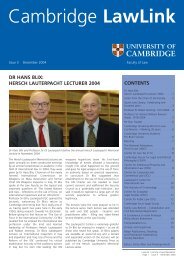Contents - Faculty of Law - University of Cambridge
Contents - Faculty of Law - University of Cambridge
Contents - Faculty of Law - University of Cambridge
You also want an ePaper? Increase the reach of your titles
YUMPU automatically turns print PDFs into web optimized ePapers that Google loves.
1. Introduction: Types <strong>of</strong> IPRs. National effect and international relations. Movements for regional rights andinternational harmonisation. Problems <strong>of</strong> enforcement.2. Patents for inventions: Subject matter, interpretation, validity, infringement. Entitlement and dealings. Employees’inventions. Abuse <strong>of</strong> monopoly.3. Confidential information: trade secrets, governmental and personal secrets – bases and scope <strong>of</strong> protection.4. Trade marks, names, get-up, etc: common law liability.5. Trade mark registration: objectives; registrability; continuing validity; infringement.6. Copyright: authors’ rights and neighbouring rights; basic concepts: work, author, originality, term, qualification.Infringement, exceptions and moral rights. Ownership and dealings. Complex products: film, multi-media works.Databases. Industrial Designs.7. Intellectual Property in the EU: freedom to move goods and provide services.READINGIntroductory:Davis, Intellectual Property (3rd ed 2008)General:Aplin and Davis, Intellectual Property <strong>Law</strong>: Text, Cases and Materials (2009)Bently and Sherman, Intellectual Property <strong>Law</strong> (3rd ed 2008)Cornish and Llewellyn, Intellectual Property: Patents, Copyright, Trade Marks and Allied Rights (7th ed 2010)Cases and Statutes:Cornish, Materials on Intellectual Property (5th ed 2006)Blackstone’s Statutes on Intellectual Property (8th ed 2006)PAPER 13. CONTEMPORARY ISSUES IN THE LAW OF EUROPEAN INTEGRATIONThe course provides a space on the syllabus for discussion <strong>of</strong> topical issues in EU law, and thus for students to developan academic understanding <strong>of</strong> the debates which are preoccupying politicians and the media. The content <strong>of</strong> the courseis necessarily flexible but this year will focus on four issues: the functioning and reform <strong>of</strong> the EU’s system <strong>of</strong> judicialprotection, the EU’s system for human rights protection, (de)pillarisation, and competences in the EU.1. The functioning and reform <strong>of</strong> the EU’s system <strong>of</strong> judicial protection(i) Seminar on the basic legal provisions concerning the ECJ (preliminary rulings, actions for annulment, etc)(ii) Proposals for procedural/substantive/structural reform <strong>of</strong> the ECJ(iii) Different perspectives on the ECJ and its role (judicial activism, political science, economics)(iv) Examining the role <strong>of</strong> the ECJ and its interaction with national systems in different sectors <strong>of</strong> judicial activity(eg consumer law, free movement law)87


